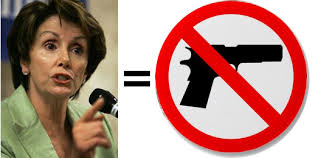
WND – by Garth Kant
It was called the strongest pro-gun bill in the country, and now it’s the law in Kansas.
The law is designed to counter the push by liberal federal lawmakers for increased restrictions on gun rights. It nullifies any new limits on firearms, magazines and ammunition – whether enacted by Congress, presidential executive order or any agency.
If Congress would have passed the Senate amendment expanding federal background checks, for example, the Kansas law would nullify it in the state.
Kansas Gov. Sam Brownback, a Republican, signed Senate Bill 102 into law yesterday, which exempts Kansas from any laws the federal government might pass that would infringe on Second Amendment rights.
Specifically, the Kansas law prevents federal law enforcement officials from enforcing any laws restricting Second Amendment rights.
To ease concerns by some lawmakers over showdowns, federal officers would not be handcuffed or jailed, but they would be prosecuted.
The law is significant not just because of its intent, but because of who signed it. Brownback is a major political figure in the Republican Party who served as a congressman and a senator for the state until election as governor in 2010. Throwing his weight behind a “nullification” law lends credibility to a growing trend.
An impressive 32 state legislatures have now introduced pro-Second Amendment “nullification” bills. The progress of the bills can be tracked at the Tenth Amendment Center’s website.
Montana began the trend with its Firearms Freedom Act. The law is currently tied up in the 9th Circuit Court of Appeals, which heard arguments last month. The Cato and Goldwater Institutes have filed a friend-of-the-court brief, “arguing that federal law doesn’t preempt Montana’s ability to exercise its sovereign police powers to facilitate the exercise of individual rights protected by the Second and Ninth Amendments.”
As WND reported, several more states have now passed laws modeled after Montana’s Firearms Freedom Act. Earlier this month, Arizona joined Wyoming, South Dakota, Utah, Tennessee and Montana.
The laws are generally justified by references to the Second, Ninth and Tenth Amendments to the Constitution. The Second Amendment guarantees the right to firearms. The Ninth Amendment makes it clear that citizens have rights not specifically listed in the Constitution. And the Tenth Amendment says states have powers not specifically given to the federal government or specifically denied to states.
Supporters of states’ rights have said the Tenth Amendment can nullify federal laws that are unconstitutional or beyond the federal government’s powers.
“Nullification” has been used as a legal argument to try to overturn everything from pro-slavery laws to Obamacare, always unsuccessfully. The U.S. Supreme Court has ruled that under the Supremacy Clause of the Constitution, federal law is superior to state law and that federal courts have the final say on interpreting the Constitution.
But with the momentum of 32 states having introduced pro-Second Amendment nullification bills, that may change.
Michael Boldin, founder of the Tenth Amendment Center, said there are many ways to nullify a law.
“The courts can strike a law down. The executive branch could refuse to enforce it. People in large numbers might refuse to comply. A number of states could pass a law making its enforcement illegal. Or a number a states could refuse to cooperate in any way with its enforcement.”
Before it became law, Boldin called the Kansas measure the strongest nullification bill in modern American history.
A key provision of the Kansas’ Second Amendment Protection Act reads:
(a) Any act, law, treaty, order, rule or regulation of the government of the United States which violates the Second Amendment to the Constitution of the United States is null, void and unenforceable in the state of Kansas.
Boldin wrote yesterday that another key part of the law is that Kansas “would not be allowed to participate in any federal gun control measures that restrict the individual right to keep and bear arms as understood in 1861.”
That’s because any federal laws undermining the Second Amendment would not be part of what Kansas agreed to when it joined the U.S.
According to Boldin, there is another key factor that may swing power in the favor of states seeking to enforce nullification laws.
He wrote, “The federal government does not have the manpower to enforce all its laws. State and local law enforcement often times carry the water during investigations and actual arrests.
“If states pass laws banning both state and local participation – in any way – with the enforcement of a federal law – that federal law would never be enforced.”
As WND reported earlier this month, a key supporter of Montana’s Firearms Freedom Act says nullification laws are needed to break a near-monopoly on guns by the federal government.
According to Gary Marbut of the Montana Shooting Sports Association, the “current federal scheme of regulating the supply system for new firearms in the U.S. is so complete it might actually constitute a government monopoly on the supply of firearms.”
“Under current federal regulation, no firearm may be made and sold to another person without federal government permission – not one firearm,” he said.
To submit to a government gun monopoly, he said, would be to believe “that the Constitution is an old, dead, obsolete and meaningless piece of paper, the Ninth Amendment is as worthless as the rest, and has no relevance to the [Montana Firearms Freedom Act].”
Derek Sheriff reported at the Arizona Tenth Amendment Center that Arizona’s bill asserts the state’s “sovereignty under the Tenth Amendment and the people’s unenumerated rights under the Ninth Amendment.”
“They also emphasize the fact that when Arizona entered the union in 1912, its people did so as part of a contract between the state and the people of Arizona and the United States,” he said.
Kurt Hofmann of the St. Louis Gun Rights Examiner said the surging movement across the states is “a challenge to the federal government’s grotesquely expansive use of the interstate commerce to regulate – well … everything, whether it has anything to do with interstate commerce or not.”
“Liberty doesn’t just happen – it needs to be worked for,” he said. “Getting that work done can make the difference between having to work for liberty, and having to fight for it.”
Marbut, who has described himself as the godfather of the Firearms Freedom Act movement, has reported previously that while the Constitution’s Commerce Clause can be viewed as regulating interstate commerce, it also can be viewed as having been modified when the later Second Amendment assuring citizens of the right to own weapons was adopted.
No less significant, he suggests, is the Ninth Amendment, which states, “The enumeration in the Constitution of certain rights shall not be construed to deny or disparage others retained by the people.”
Boldin said Washington likely is looking for a way out of the dispute.
“I think they’re going to let it ride, hoping some judge throws out the case,” he told WND. “When they really start paying attention is when people actually start following the [state] firearms laws.”
WND reported that when Wyoming joined the states with self-declared exemptions from federal gun regulation, officials there took the unusual step of including penalties for any agent of the U.S. who “enforces or attempts to enforce” federal gun rules on a “personal firearm.”
The penalties could be up to two years in prison and $2,000 in fines for an offender.
But the bellwether likely is to be the lawsuit agaisnt the Montana law, which was the first to go into effect.
As WND reported, the action was filed by the Second Amendment Foundation and the Montana Shooting Sports Association in U.S. District Court in Missoula, Mont., to validate the principles and terms of the Montana Firearms Freedom Act, which took effect Oct. 3, 2009.
Marbut argues that the federal government was created by the states to serve the states and the people, and it is time for the states to begin drawing boundaries for the federal government and its agencies.
Read more at http://www.wnd.com/2013/04/new-law-protects-2nd-amendment-from-feds/#vemd78M1tKKbBb4f.99


 I’ve literally waited months to sit down and actually write some sort of piece on events surrounding the incident on Independence Day brought forth by
I’ve literally waited months to sit down and actually write some sort of piece on events surrounding the incident on Independence Day brought forth by 







 In the face of the outrageous IRS intimidation scandal now sweeping across America, gun control advocates are changing their tune. All of a sudden, the idea that the federal government could engage in tyranny against the People of America is no longer a “conspiracy theory.” It’s historical fact right in your face thanks to all the recent scandals now bursting onto the scene: IRS intimidation, secret targeting of non-profit groups for possible “thought crimes,” the Department of Justice seizing AP phone records and so on.
In the face of the outrageous IRS intimidation scandal now sweeping across America, gun control advocates are changing their tune. All of a sudden, the idea that the federal government could engage in tyranny against the People of America is no longer a “conspiracy theory.” It’s historical fact right in your face thanks to all the recent scandals now bursting onto the scene: IRS intimidation, secret targeting of non-profit groups for possible “thought crimes,” the Department of Justice seizing AP phone records and so on.



 If a group at the
If a group at the 
 A three-day-old baby was thrown on a bonfire and burned to death in an horrific ritual because a cult leader had decided she was the antichrist and that the end of the world was near.
A three-day-old baby was thrown on a bonfire and burned to death in an horrific ritual because a cult leader had decided she was the antichrist and that the end of the world was near. Wanted: Chilean authorities said the 12-member sect was formed in 2005 and was led by Ramon Gustavo Castillo Gaete, 36, who remains at large
Wanted: Chilean authorities said the 12-member sect was formed in 2005 and was led by Ramon Gustavo Castillo Gaete, 36, who remains at large
 Just a little over a year ago, President Obama signed an Executive Order titled
Just a little over a year ago, President Obama signed an Executive Order titled 





 According to Vice President Biden, “President Obama literally has a buttload of executive actions coming down the pike” on gun control, the phrasing of which stirs disturbing surrealist images in my mind.
According to Vice President Biden, “President Obama literally has a buttload of executive actions coming down the pike” on gun control, the phrasing of which stirs disturbing surrealist images in my mind. Under the alarmist perspective of man-made climate change, founders Rob Hopkins and Naresh Giangrande created the
Under the alarmist perspective of man-made climate change, founders Rob Hopkins and Naresh Giangrande created the 
